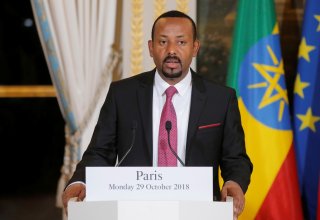Border Wars: Ethiopia and Sudan to Settle Al-Fashaqa Border Dispute
The agreement comes after the killing of several Sudanese soldiers in a border clash.
Ethiopian prime minister Abiy Ahmed claimed on Tuesday that he had reached an understanding with Gen. Abdel Fattah al-Burhan, the leader of Sudan, to resolve the issue of a disputed border area between the two neighbors. The agreement comes after the killing of several Sudanese soldiers in a border clash.
The incident, which occurred on June 22, reportedly resulted in the capture and subsequent execution of seven Sudanese soldiers by the Ethiopian Army. Ethiopia continues to deny its involvement in the incident, claiming instead that a local militia carried out the killings, which it insists it opposed.
Burhan and Abiy’s meeting took place in Nairobi, the capital of neighboring Kenya, on Tuesday on the sidelines of a meeting of the Intergovernmental Authority on Development (IGAD), a bloc of eight east African nations. Abiy claimed in a tweet that he and Burhan had “both agreed that our two countries have plenty of collaborative elements to work on peacefully,” adding that the two heads of state had “both made a commitment for dialogue [and] peaceful resolution to outstanding issues.”
Burhan also praised the two leaders’ meeting, claiming that the IGAD summit had given them an opportunity “to take stock of the response” to regional challenges. “We are happy to convene in a very short time to discuss matters of great importance,” he added without further elaboration.
The al-Fashaqa region, where the Sudanese soldiers were reportedly captured, has historically been contested between Khartoum and Addis Ababa. Although the territory is internationally recognized as part of Sudan, it has long been settled by Ethiopian farmers. Following a series of clashes during the 1990s, it was agreed that the Ethiopian farmers would continue to work in the disputed area, but Sudanese security forces would occupy it.
However, tensions have built up in the al-Fashaqa area following a broader deterioration in relations between Ethiopia and Sudan, largely over Ethiopia’s construction of the Grand Ethiopian Renaissance Dam across the Blue Nile river, one of the two major tributaries of the Nile within Sudan. Khartoum has also expressed frustration over Ethiopia’s ongoing war in its northern Tigray region, which has led to a regional refugee crisis and prompted tens of thousands of Ethiopians to seek shelter in Sudan, which the Sudanese government has struggled to provide.
The day after the Sudanese soldiers’ capture and execution, Ethiopian officials claimed that Sudan had launched artillery strikes into Ethiopia, further straining the two countries’ relationship.
Trevor Filseth is a current and foreign affairs writer for the National Interest.
Image: Reuters.

